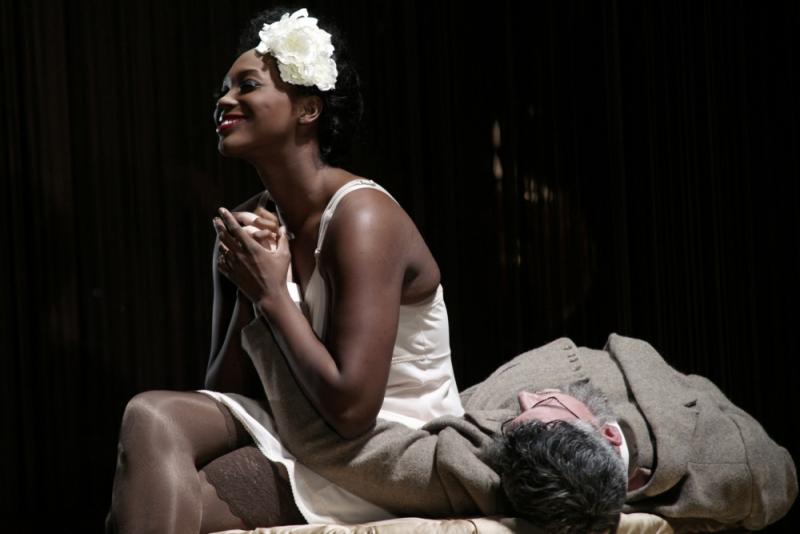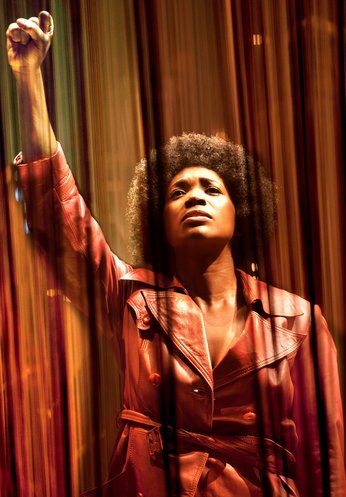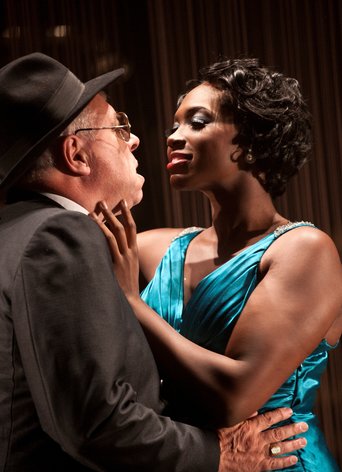American Lulu, Young Vic | reviews, news & interviews
American Lulu, Young Vic
American Lulu, Young Vic
A reworking of an operatic classic adds nothing and loses so much of the original

We all know the drill: Wedekind’s Lulu is a page men have written on through the centuries, the canvas on which they have painted their desires, the feminine void they have filled. The patriarchy have appropriated her, and the perverts, and now it’s contemporary composer Olga Neuwirth’s turn.
Neuwirth’s reworking of Berg’s unfinished opera (itself an adaptation of Wedekind’s Lulu plays) purports to voice the unvoiced, to empower the heroine to wrest her story out of the hands of men. What it actually does is add yet another palimpsest-layer to an already overladen archetype, denying Lulu her humanity once again, but this time in the name of emancipation.
American Lulu hasn’t much to say about Lulu, and still less to say about America
Taking advantage of Berg’s incomplete Act III, Neuwirth substitutes the traditional Friedrich Cerha performing edition with her own jazz-fuddled rewriting, ripping up Berg’s elegant palindrome of an ending and replacing it with a baffling musical revenge-fantasy in which Lulu claims the phallic gun and murders her lovers, killing with them (one supposes) the oppressive forces of racism, sexism and capitalism. Neuwirth relocates the action to mid-century America, using Martin Luther King and Rosa Parkes as sonic and emotional background music. The result is not so much of the period as in it; Lulu is a southern civil rights activist in the Sixties just as Lulu at a fancy-dress party might be a lion or Marilyn Monroe.
 The dialogue of Wedekind’s Lulu plays has been described as “unnatural, stylised, and at times even absurd”. The only compliment I can pay Neuwirth is that her libretto for Act III lives up in every way to the original. Her hack job on Acts I and II is rather less faithful however, cutting apparently arbitrary chunks of plot and music and hoping that enough of the audience is familiar with the original to be able to fill in the blanks (the hordes who left mid-show evidently weren’t). Henry James might have proved the intensifying potential of the ellipsis, but Neuwirth hasn’t got his touch.
The dialogue of Wedekind’s Lulu plays has been described as “unnatural, stylised, and at times even absurd”. The only compliment I can pay Neuwirth is that her libretto for Act III lives up in every way to the original. Her hack job on Acts I and II is rather less faithful however, cutting apparently arbitrary chunks of plot and music and hoping that enough of the audience is familiar with the original to be able to fill in the blanks (the hordes who left mid-show evidently weren’t). Henry James might have proved the intensifying potential of the ellipsis, but Neuwirth hasn’t got his touch.
The world premiere production of American Lulu at Berlin’s Komische Oper was a flop. This current production by John Fulljames is the second, and proof that the problems are really with the piece and not just the presentation. Fulljames takes advantage of the endlessly flexible Young Vic space to create an appealing quasi-cabaret with Brechtian onstage dressing area, moving Lulu in and out of sight behind dangling bead curtains that turn us into imaginative voyeurs. Projected animations (Finn Ross) are a major mis-step however, offering a comic-strip reduction of missing scenes (including a mystifying Team America-esque puppet-rape of Eleanor (the Countess Geschwitz of this version), seemingly standing in for the cholera episode of the original.
 Neuwirth’s score, while lush in brass and wind, is melodically angular and sits awkwardly for the voice. Angel Blue’s Lulu (pictured above) makes you long to hear her sing the Berg straight, glistening-pure at the top and committing even to the most outlandish idiocies of the libretto. Physically she’s not entirely at ease, but then it’s hard to see how she could be, given the paradoxes of character Neuwirth’s reworking have created. Meaner and more nakedly manipulative than her original, this wild child has nothing to redeem her. Whether we learn more from a wicked woman who vanquishes her male foes than a victimised woman ultimately destroyed by them is moot.
Neuwirth’s score, while lush in brass and wind, is melodically angular and sits awkwardly for the voice. Angel Blue’s Lulu (pictured above) makes you long to hear her sing the Berg straight, glistening-pure at the top and committing even to the most outlandish idiocies of the libretto. Physically she’s not entirely at ease, but then it’s hard to see how she could be, given the paradoxes of character Neuwirth’s reworking have created. Meaner and more nakedly manipulative than her original, this wild child has nothing to redeem her. Whether we learn more from a wicked woman who vanquishes her male foes than a victimised woman ultimately destroyed by them is moot.
Transforming Geschwitz into a jazz singer (Jacqui Dankworth, condemned to sing every line into a Brechtian microphone, trailing its flaccid little tail around the stage) allows Neuwirth to incorporate the bluesy sensibility that becomes the most American thing about the show, but meshes poorly with the rest of the musical fabric. The London Sinfonietta play loudly throughout under Gerry Cornelius, sacrificing line for precision and nuance for emphasis. Paul Curievici’s Photographer and Robert Winslade Anderson’s Clarence cope well over it, but Donald Maxwell’s lack of vocal focus slips over into his characterisation too, rendering Dr Bloom (pictured left with Blue) curiously passive.
American Lulu hasn’t much to say about Lulu, and still less to say about America. Civil rights, female emancipation, sexual morality and capitalist exploitation might make for good operatic buzzwords in the contemporary opera house, but they make for a pretty terrible evening.
rating
Share this article
The future of Arts Journalism
You can stop theartsdesk.com closing!
We urgently need financing to survive. Our fundraising drive has thus far raised £49,000 but we need to reach £100,000 or we will be forced to close. Please contribute here: https://gofund.me/c3f6033d
And if you can forward this information to anyone who might assist, we’d be grateful.

Subscribe to theartsdesk.com
Thank you for continuing to read our work on theartsdesk.com. For unlimited access to every article in its entirety, including our archive of more than 15,000 pieces, we're asking for £5 per month or £40 per year. We feel it's a very good deal, and hope you do too.
To take a subscription now simply click here.
And if you're looking for that extra gift for a friend or family member, why not treat them to a theartsdesk.com gift subscription?
more Opera
 Giustino, Linbury Theatre review - a stylish account of a slight opera
Gods, mortals and monsters do battle in Handel's charming drama
Giustino, Linbury Theatre review - a stylish account of a slight opera
Gods, mortals and monsters do battle in Handel's charming drama
 Susanna, Opera North review - hybrid staging of a Handel oratorio
Dance and signing complement outstanding singing in a story of virtue rewarded
Susanna, Opera North review - hybrid staging of a Handel oratorio
Dance and signing complement outstanding singing in a story of virtue rewarded
 Ariodante, Opéra Garnier, Paris review - a blast of Baroque beauty
A near-perfect night at the opera
Ariodante, Opéra Garnier, Paris review - a blast of Baroque beauty
A near-perfect night at the opera
 Cinderella/La Cenerentola, English National Opera review - the truth behind the tinsel
Appealing performances cut through hyperactive stagecraft
Cinderella/La Cenerentola, English National Opera review - the truth behind the tinsel
Appealing performances cut through hyperactive stagecraft
 Tosca, Royal Opera review - Ailyn Pérez steps in as the most vivid of divas
Jakub Hrůša’s multicoloured Puccini last night found a soprano to match
Tosca, Royal Opera review - Ailyn Pérez steps in as the most vivid of divas
Jakub Hrůša’s multicoloured Puccini last night found a soprano to match
 Tosca, Welsh National Opera review - a great company reduced to brilliance
The old warhorse made special by the basics
Tosca, Welsh National Opera review - a great company reduced to brilliance
The old warhorse made special by the basics
 BBC Proms: The Marriage of Figaro, Glyndebourne Festival review - merriment and menace
Strong Proms transfer for a robust and affecting show
BBC Proms: The Marriage of Figaro, Glyndebourne Festival review - merriment and menace
Strong Proms transfer for a robust and affecting show
 BBC Proms: Suor Angelica, LSO, Pappano review - earthly passion, heavenly grief
A Sister to remember blesses Puccini's convent tragedy
BBC Proms: Suor Angelica, LSO, Pappano review - earthly passion, heavenly grief
A Sister to remember blesses Puccini's convent tragedy
 Orpheus and Eurydice, Opera Queensland/SCO, Edinburgh International Festival 2025 review - dazzling, but distracting
Eye-popping acrobatics don’t always assist in Gluck’s quest for operatic truth
Orpheus and Eurydice, Opera Queensland/SCO, Edinburgh International Festival 2025 review - dazzling, but distracting
Eye-popping acrobatics don’t always assist in Gluck’s quest for operatic truth
 MARS, Irish National Opera review - silly space oddity with fun stretches
Cast, orchestra and production give Jennifer Walshe’s bold collage their all
MARS, Irish National Opera review - silly space oddity with fun stretches
Cast, orchestra and production give Jennifer Walshe’s bold collage their all
 Káťa Kabanová, Glyndebourne review - emotional concentration in a salle modulable
Janáček superbly done through or in spite of the symbolism
Káťa Kabanová, Glyndebourne review - emotional concentration in a salle modulable
Janáček superbly done through or in spite of the symbolism
 Buxton International Festival 2025 review - a lavish offering of smaller-scale work
Allison Cook stands out in a fascinating integrated double bill of Bernstein and Poulenc
Buxton International Festival 2025 review - a lavish offering of smaller-scale work
Allison Cook stands out in a fascinating integrated double bill of Bernstein and Poulenc

Add comment